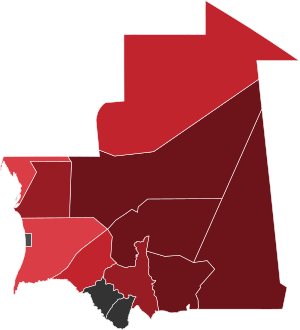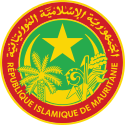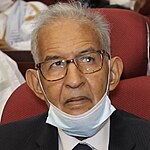
Mauritania is a presidential democracy, but has suffered from repeated military coups since its Independence in November 1960. For 18 years after independence, Mauritania was a one-party state under Moktar Ould Daddah. This was followed by decades of military rule. The first fully democratic presidential election in Mauritania occurred on 11 March 2007, which marked a transfer from military to civilian rule following the military coup in 2005. The election was won by Sidi Ould Cheikh Abdallahi, who was ousted by another military coup in 2008 and replaced by general Mohamed Ould Abdel Aziz. Mauretania underwent its first peaceful transition of power after the 2019 presidential election, although this was between two presidents of the ruling UPR party and former army generals.

Elections in Mauritania encompass four different types: presidential elections, parliamentary elections, regional elections and local elections.
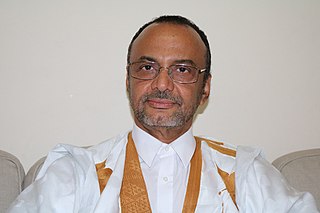
Sidi Mohamed Ould Boubacar is a Mauritanian politician who was Prime Minister of Mauritania, twice, from 1992 to 1996 and again from 2005 to 2007.
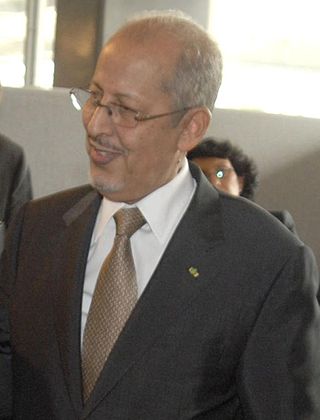
Presidential elections were held in Mauritania on 11 March 2007. As no candidate received a majority of the votes, a second round was held on 25 March between the top two candidates, Sidi Ould Cheikh Abdallahi and Ahmed Ould Daddah. Abdallahi won the second round with about 53% of the vote and took office in April.
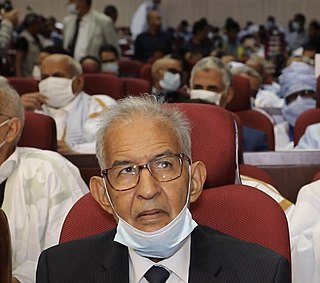
Ahmed Ould Daddah is a Mauritanian economist and a politician. He is a half-brother of Moktar Ould Daddah, the first President of Mauritania, and belongs to the Marabout Ouled Birri tribe. He is currently the President of the Rally of Democratic Forces (RFD) and was designated as the official Leader of the opposition following the 2007 presidential election, in which he placed second.
Ibrahima Moctar Sarr is a Mauritanian journalist and politician of the Fulani ethnicity. Running as an independent candidate, he placed fifth in the March 2007 presidential election, and he has been the President of the Alliance for Justice and Democracy/Movement for Renewal (AJD/MR) party from August 2007 until January 2024.
The People's Progressive Alliance is a small political party in Mauritania.

General elections were held in Ghana on 7 December 2008. Since no candidate received more than 50% of the votes, a run-off election was held on 28 December 2008 between the two candidates who received the most votes, Nana Akufo-Addo of the governing New Patriotic Party and John Atta Mills of the opposition National Democratic Congress. Mills was certified as the victor by a margin of less than one percent, winning the presidency on his third attempt. It is to date the closest election in Ghanaian history.
In December 1984, Haidallah was deposed by Colonel Maaouya Ould Sid'Ahmed Taya, who, while retaining tight military control, relaxed the political climate. Ould Taya moderated Mauritania's previous pro-Algerian stance, and re-established ties with Morocco during the late 1980s. He deepened these ties during the late 1990s and early 2000s as part of Mauritania's drive to attract support from Western states and Western-aligned Arab states. Mauritania has not rescinded its recognition of Polisario's Western Saharan exile government and remains on good terms with Algeria. Its position on the Western Sahara conflict has been, since the 1980s, one of strict neutrality.

Mauritania, officially the Islamic Republic of Mauritania, is a sovereign country in Northwest Africa. It is bordered by the Atlantic Ocean to the west, Western Sahara to the north and northwest, Algeria to the northeast, Mali to the east and southeast, and Senegal to the southwest. By land area Mauritania is the 11th-largest country in Africa and 28th-largest in the world; 90% of its territory is in the Sahara. Most of its population of some 4.3 million lives in the temperate south of the country, with roughly a third concentrated in the capital and largest city, Nouakchott, on the Atlantic coast.

Presidential elections were held in Mauritania on 18 July 2009. Mohamed Ould Abdel Aziz, who led the 2008 coup d'état, won a narrow first-round majority in the election, according to official results. A second round, if necessary, would have been held on 1 August 2009.

The Alliance for Justice and Democracy/Movement for Renewal is a small political party in Mauritania. It represents the black minority population of the south of the country, centered on the Senegal River valley, and was formed and was led by rights activist and former presidential candidate Ibrahima Moctar Sarr.

Presidential elections were held in Mauritania on 12 December 1997. Incumbent President Maaouya Ould Sid'Ahmed Taya won the election with 90% of the vote. Voter turnout was 75%.

Presidential elections were held for the first time in Mauritania on 20 August 1961 to elect the President for the next five years. Moktar Ould Daddah, who had been acting head of state since independence from France in 1960 was the only candidate, and was elected unopposed. Although he was a member of the ruling Mauritanian Regroupment Party, his candidacy was also supported by the Mauritanian National Union. Voter turnout was 94%.

Presidential elections were held in Mauritania on 7 August 1966. Following the merger of all the country's political parties into the Mauritanian People's Party (PPM), the country had become a one-party state in December 1961. Its leader, incumbent President Moktar Ould Daddah, was the only candidate, and was re-elected unopposed. Voter turnout was 96%.

General elections were held in Mauritania on 8 August 1971 to elect a President and National Assembly, the first time the two elections had been held together. At the time, the country was a one-party state with the Mauritanian People's Party (PPM) as the sole legal party. Its leader, incumbent President Moktar Ould Daddah, was the only candidate in the presidential election, and was re-elected unopposed to a third term in office, whilst the PPM won all 50 seats in the National Assembly election. Voter turnout for the parliamentary election was reported to be 95.6%.

Presidential elections were held in Mauritania on 8 August 1976, alongside a parliamentary by-election for the new seven seats representing Tiris El Gharbiya, the Mauritanian-occupied area of Western Sahara. At the time, the country was a one-party state with the Mauritanian People's Party (PPM) as the sole legal party. Its leader, incumbent President Moktar Ould Daddah, was the only candidate and was re-elected unopposed. Voter turnout was 97.9%. They were the last elections held until the restoration of multi-party democracy in 1992.

Presidential elections were held in Mauritania on 21 June 2014, with a second round planned for 5 July if no candidate received more than 50% of the vote. The result was a first round victory for incumbent President Mohamed Ould Abdel Aziz of the Union for the Republic, who received 82% of the vote. Most of the opposition parties boycotted the election.

Presidential elections were held in Mauritania on 22 June 2019, with a second round planned for 6 July if no candidate had received more than 50% of the vote. The result was a first round victory for Mohamed Ould Ghazouani who won with 52 percent of the vote. However, opposition rejected the results, calling it "another army coup." On 1 July 2019, Mauritania's constitutional council confirmed Ghazouani as president and rejected a challenge by the opposition.
